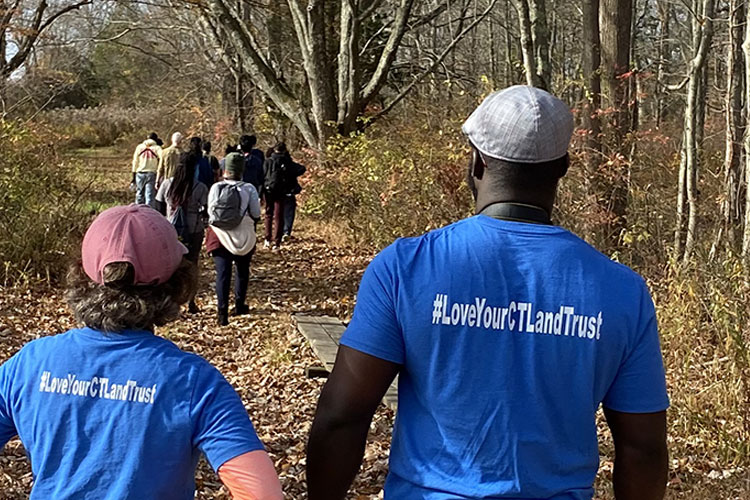This toolkit helps land trusts and community groups implement greening projects—like parks, trails, or green infrastructure—without displacing the very communities they aim to serve. Packed with case studies, planning templates, and anti-displacement strategies, it offers practical guidance for centering equity in environmental work. Ideal for organizations committed to inclusive, community-led conservation.
How are land trusts across New England thinking about and implementing DEI efforts? This 2022 report explores real-world strategies, challenges, and opportunities as shared by land trust staff and board members across the region. With candid quotes, thoughtful analysis, and practical recommendations, it’s a valuable read for any land trust looking to incorporate principles of equity and inclusion in their conservation work.
Looking to deepen your understanding of Indigenous cultural practices and build more respectful relationships with Indigenous communities? This free guide offers practical advice on protocols for land acknowledgements, engaging elders, participating in ceremonies, and more. Whether you’re planning a meeting, event, or partnership, these insights can help ensure your approach is informed, respectful, and rooted in reconciliation. A valuable read for land trusts committed to inclusion and cultural awareness.
Thinking about allowing research on your conserved land? This resource bundle includes practical templates and examples to guide you through the process — from initial inquiry to final publication. You’ll find a checklist of sequential steps, sample insurance language, a model letter of agreement, and more to help your land trust evaluate and manage research proposals with confidence.
This CLCC-produced resource provides a clear overview of what land trusts do, how they operate, and why they matter, making it a great introduction for landowners, board members, volunteers, partners, and the public. Whether you’re explaining your mission to a new audience or strengthening your outreach efforts, this guide helps convey the vital role land trusts play in safeguarding natural and working lands.
Land trusts play a critical role in ensuring that farmland remains accessible, productive, and protected for future generations. “Farmland Access & Ownership: An Overview of Barriers, Models, and Actions to Increase Land Access for Connecticut’s BIPOC Farmers”, examines the challenges farmers face in securing land and explores opportunities for land trusts to support farmland affordability, leasing models, and long-term conservation. With data-driven insights and policy recommendations, this resource helps land trusts strengthen their farmland protection efforts, engage with local farmers, and develop strategies to keep working lands in agricultural production.
The Land Trust Alliance has made available the Framework and Resources for Change, a tool to help land trusts organize learning and grow critical Diversity, Equity and Inclusion competencies, no matter where they are in their learning journey. Thanks to generous funding of an anonymous foundation and other individual donations, the Alliance hosted a webinar “Making the Most of the DEI Framework & Resources for Change” to introduce this tool and help land trust board members, staff and volunteers get started on their DEI journeys.
Diversifying organizations through their boards, staff, and committees is essential for reflecting community diversity and enhancing decision-making. These resources provide insights on inclusive conservation, outline change processes for racial equity, offer roadmaps to inclusivity, guide on hiring diversely, and discuss barriers to organizational change. Together, they can be used to create environments and organizations where diverse perspectives are valued and drive forward the mission of land conservation.
Land conservation isn’t just about protecting nature—it brings economic, environmental, and community benefits that enhance quality of life. The resources compiled below outline the many ways open space contributes to clean water, climate resilience, recreation, public health, and local economies. Whether you’re advocating for conservation funding, engaging your community, or strengthening your land trust’s messaging, these resources provide compelling facts and insights to support your efforts.
While land conservation and affordable housing are often framed as competing priorities, Connecticut communities need both to thrive. In partnership with the Land Trust Alliance and the Trust for Public Land, CLCC hosted a full-day event exploring how housing and conservation organizations can collaborate for greater impact. The discussions highlighted successful partnerships, demonstrating how joint efforts can foster healthier, more equitable housing, expand land conservation, and unlock additional funding for shared initiatives.
Ensuring everyone feels welcome, safe, and included on birding experiences requires thoughtful communication. These resources from Birdability offer land trusts practical guidance on how to effectively communicate and engage with and engage people of all abilities, including those with mobility challenges, vision impairments, intellectual disabilities, neurodivergence, mental health conditions, hearing impairments, and chronic illnesses. Discover best practices for creating accessible outings, using inclusive language, and adapting programs to ensure birding is truly accessible and enjoyable for everyone in your community.
Leasing Land to Farmers: A Handbook for Land Trusts & Municipalities provides guidance on establishing successful farm leases that support both agricultural viability and conservation goals. Land trusts can use this resource to develop lease agreements, strengthen farmer-landowner relationships, and ensure sustainable land management practices.
